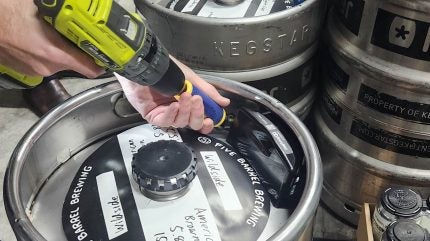
Australia-based tech company BinaryBeer has developed an internet of things (IoT) solution called KegLink.
The company claims the smart keg management system solves the question for beer distributors of what happens to the beer once it leaves the brewery. Deploying smart kegs since 2018, the solution provides geolocation tracking, as well as data on temperature and freshness.
In 2023, Asahi Group Holdings teamed up with BinaryBeer to use the tech on the Japan-based brewing giant’s kegs, monitoring their journey across Europe.
Speaking to Just Drinks, BinaryBeer CEO Michael Burton gave insights into the benefits of the solution, the challenges they encountered in developing the technology and other opportunities for the use of IoT in the industry.
Just Drinks: What are the core benefits of deploying smart kegs?
Michael Burton: Smart kegs, unlike keg trackers, provide comprehensive data to enhance overall brewery operations, not just tracking kegs. They offer real-time beer consumption data for instant sales campaign feedback, live inventory updates from licensees for efficient replenishment and insights into beer quality and sustainability. Considering a keg’s cost is up to a few hundred dollars, safeguarding this asset is crucial.
Moreover, a single keg can transport beer worth tens of thousands of dollars in its lifetime, so focusing on how smart kegs can boost sales, maintain beer freshness, and promote sustainability is more beneficial than mere keg tracking. At BinaryBeer, we understand this; hence, KegLink is more than just a physical attachment to the keg – it’s part of our holistic solution.
Just Drinks: What were some of the challenges in creating and deploying the KegLink solution?
Burton: Many newcomers to the challenge might assume that implementing a solution like KegLink is straightforward — simply attach GPS sensors to kegs and transmit data wirelessly. However, there are a range of challenges to overcome due to the unique nature of the draught beer supply chain. These challenges required us to innovate solutions in several areas.
Unfortunately, GPS isn’t a good fit for geolocation within draught beer supply chains. Kegs stored in cellars or stacked under others aren’t able to depend on GPS. To solve this, we developed a proprietary cloud-based geolocation system using sensor fusion and machine learning, ensuring reliable tracking within the supply chain.
Standard asset tracker antennas are ineffective when mounted on metal beer kegs. Addressing this, we created bespoke antennas to ensure efficient operation in proximity to metal, which also helps conserve battery life and reduce black spots in the supply chain.
The physical handling of kegs – including being dropped, hit, and exposed to harsh chemicals – presents significant challenges. We focused on designing KegLink sensors with robust form factors and attachment mechanisms, ensuring they were well-protected against physical shocks and environmental conditions.
Determining a keg’s fill status was among our most complex challenges. After exploring several technologies from load-cells to ultrasonics to machine learning around the acoustics of full and empty kegs, we developed a robust method to detect when kegs are connected to serving systems, accurately determining their fullness, emptiness and consumption rate.
These challenges demanded a high level of innovation from our team, and the solutions we developed have been integral in making Smart Kegs a reality.
Just Drinks: What other use cases for IoT are you working on or can anticipate for the beer and beverage industry?
Burton: While BinaryBeer is primarily focused on harnessing IoT data from the moment the beer is filled into the keg to when it’s tapped and consumed in the cellar, we’re also seeing significant advancements in smart tap and line monitoring systems that capture data from the cellar to the glass. I believe there’s substantial potential for collaboration in this area. Marrying up data sets to provide deeper insights into consumption patterns and ensuring the quality of the beverage right up to the point of serving.
Just Drinks: How many smaller businesses are you partnered with? What is the geographical distribution of these?
Burton: We work with several craft breweries around the world and have a European BinaryBeer office and channel partners in North America to help service our clients across time zones. The only continent we haven’t covered yet is Antarctica.
Just Drinks: What geographical markets are ripe for integrating IoT solutions in the beer industry?
Burton: A smart keg doesn’t cost too much more than a regular keg, so we haven’t come across a market where the IoT value proposition doesn’t stack up. What we do come across are markets where the necessary wireless coverage isn’t at a mature enough stage for reliable mobile asset monitoring. Sometimes we need to wait for telcos to finish their IoT deployments before a market is ready for commercial growth, so working closely with telcos is important in assessing which markets are ripe.
Just Drinks: Who are your main competitors and how is your product differentiated?
Burton: The draught beer distribution and cooperage management sector is a traditional market, with several established and emerging players. Before us, there were companies utilising legacy technologies like RFID and Bluetooth for keg tracking. Recently, more companies have emerged, focusing on modern mobile IoT connectivity, mainly for keg tracking purposes.
At BinaryBeer, we do so much more than keg tracking. We use live IoT data from kegs to drive organisation-wide benefits, across sales, logistics, finance, quality, and sustainability, and we’ve developed the necessary core technologies in-house that make this possible.



